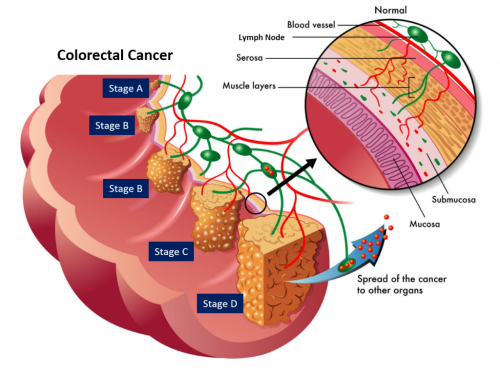Biomarker discovery offers clearer prognosis for bowel and rectal cancer patients

For the first time, a biomarker discovered by Macquarie University and Concord Repatriation General Hospital researchers will allow clinicians to distinguish certain types of colorectal cancer patients who do relatively well after surgery from those who may subsequently die from their disease.
The discovery came as part of a 20-year rectal cancer surveillance study into a condition that affects 1.4 million people globally every year.
Bowel and rectal cancer is one of the most curable types of cancer if detected early. However according to Bowel Cancer Australia, fewer than 40% of bowel cancers are detected that early. A clear diagnosis in later stages can help guide clinicians to make appropriate decisions about prognosis, survival rates, surgery and other therapy options.
"We found that patients presenting with Stage B cancer – that is, confined to the bowel wall – may or may not show detection of a cancer cell biomarker called urokinase plasminogen activator receptor, simplified as uPAR," says lead researcher Professor Mark Baker, Professor of Proteomics at Macquarie University's Faculty of Medicine and Health Science.
The research showed that if the uPAR biomarker is present on the cancer cells, it is predicative of undetectable Stage B colorectal cancer metastasis and dramatically poorer survival for those Stage B patients. This has been called clinically-silent metastasis in the past and no marker of it has been available for it until now.
"Amazingly, Stage B patients with no expression of uPAR in tumour epithelial cells survive quite close to what normal population rates are, demonstrating that surgical resection for these patients can indeed be close to curative in those patients," says Baker.
The team is now chasing how the uPAR protein works cooperatively with other proteins to cause this poor outcome and are undertaking rational drug design to find novel, less toxic, cancer-specific therapies for colorectal cancer patients.
More information: Ahn SB, Chan C, Dent OF, Mohamedali A, Kwun SY, et al. (2015) "Epithelial and Stromal Cell Urokinase Plasminogen Activator Receptor Expression Differentially Correlates with Survival in Rectal Cancer Stages B and C Patients." PLoS ONE 10(2): e0117786. DOI: 10.1371/journal.pone.0117786


















